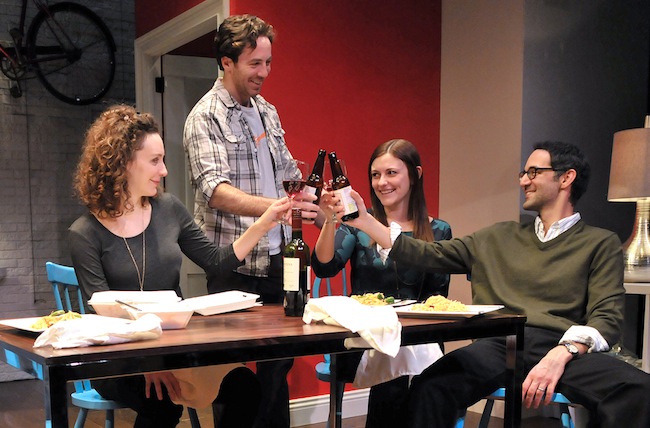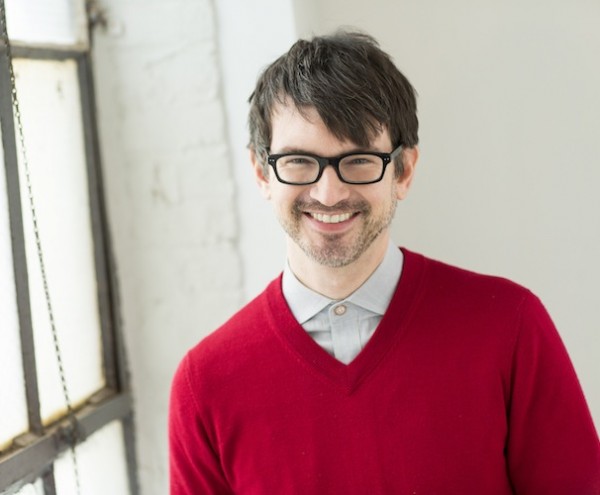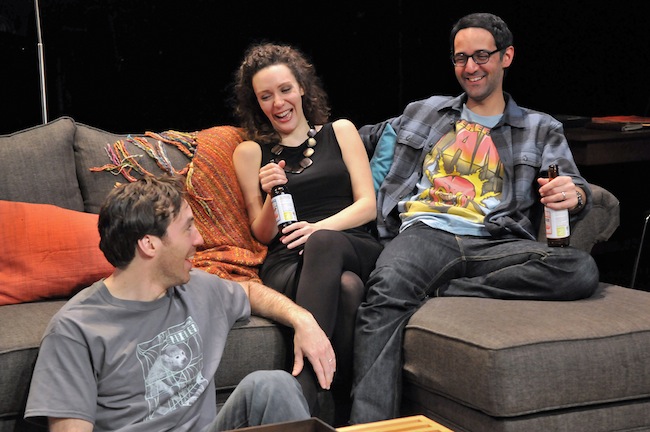Fuse Theater Interview: Playwright Ken Urban on Crafting “A Future Perfect”
“The pain depicted on stage must cut to the bone, inspire a seemingly impossible empathy within me, within the audience.”

Marianna Bassham, Brian Hastert, Chelsea Diehl, and Nael Nacer in the SpeakEasy Stage Company production of “A Future Perfect.” Photo: Craig Bailey/Perspective Photo.
By Bill Marx
With so many of Boston’s theaters, large and small, dedicated to whisking audiences off to commercially cozy ‘Neverlands,’ the production of a script that deals with the problems posed by ‘the way we live now’ (white, lower middle-class edition) is particularly welcome. Ken Urban’s A Future Perfect (a World Premiere staging directed by M. Bevin O’Gara for the SpeakEasy Stage Company through February 7) deals with an acute crisis in the lives of a quartet of thirty-somethings who for the first time are beginning to feel old and encumbered. Bumpy marriages, biological clocks, pregnancy, low-paying but idealistic jobs at PBS, high-paying but soul-killing corporate positions, dreams of independence and creativity hanging by a thread — the challenges facing these four characters are familiar to many who are struggling through the final years of the Obama administration.
I sent Ken Urban some questions via e-mail about his script — I asked what motivated him to write the play, whether he saw it as a comedy or a tragedy, and wondered what it takes to write a script about the real world in a theatrical environment that is determined to play it safe — racial tensions are fair game, but there are few serious attempts to look at the economic, technological, and social issues (national as well as global) that are not only shrinking the middle class but changing American culture.
Arts Fuse: What was the impulse behind writing this play? Personal? Political?
Ken Urban: I moved to Cambridge in the fall of 2006. As a result of leaving New York, I was back in touch with some college friends whom I hadn’t seen in years. They were playing music and asked me to join them. It was mostly us fooling around, but I started writing songs and we started to become an actual band. One night, they brought their wives over to our place and we were going to go out to eat. I tried to hand a glass of wine to the drummer’s wife, which she rebuffed, asking instead for water. Indelicately, I blurted out, “Are you pregnant?” Her face told me I was right. Next thing I know, the guitarist’s wife said they were pregnant too. I knew it was the end of the band right there.
But what was interesting hearing my friends talk during the next few months about what having kids meant, what questions it raised for them. Right before writing the play, I was in New York and I got swept up in the start of the Occupy Movement. It dawned on me that the questions that the country was asking were similar to the questions these future fathers were asking. What do we believe in? Are these our values? Are we going to fight for the things we believe in? In a sense, the play came from a personal place, but impulse then took on a political resonance as I began writing. I suppose my work is politically engaged at a fundamental level. I’ve written about the 1994 Rwandan genocide and the deformation of the American psyche during the so-called “War on Terror.” But my primary concern as an artist has always been with storytelling and character. When I’ve attempted to write a pedantic play, the writing suffers. The material has to be personal and raw; the goal is to write something that can’t be explained with easy formulas and familiar theoretical paradigms. The pain depicted on stage must cut to the bone, inspire a seemingly impossible empathy within me, within the audience. That empathy enables us to transcend, if only fleetingly, boundaries of culture, time, sexuality and class.

Playwright Ken Urban: “It feels very hard for me to communicate idealism or to imagine the possibility of change without feeling like a liar.” Photo: Kevin Thomas Garcia.
AF: What are some of the playwrights that have influenced your scripts? A Future Perfect in some ways reminded me of the work of some American short story writers — for example, Raymond Carver.
Urban: I love Carver and no doubt seeing the Robert Altman film Short Cuts (his adaptation of nine Carver short stories) left a huge impact on me when I saw it in high school: Carver’s emotional intensity, his refusal to sentimentalize the ugliness of human behavior, coupled with the sparse language that gives the reader a space to live in. I certainly wasn’t thinking of Carver when I was writing the play. But that doesn’t mean the influence wasn’t somewhere in the stew. I am a big fan of playwrights like Samuel Beckett, Sarah Kane and Adam Rapp. But I think when I’m writing, I am not worried about influences. I am not doing much thinking until I have a draft. I am trying to write something emotionally truthful. I can’t turn it into an intellectual exercise until I am revising, until I know the story and feel my characters’ pulses. I guess Kane did teach me to be a merciless in cutting. But I also learned that from being in a rehearsal room with good directors.
AF: This is a play that is more revealing about what isn’t said than for what is. Do you agree? And if so, why is this 30-something generation so repressed?
Urban: I think all great plays are about subtext, about how a physical gesture or single word can reveal the inner world of a character. Claire and Max are smart people, but they don’t always have the easiest time communicating what they are feeling. I don’t think they are repressed; they’re the opposite, in fact. They want to express the truth and that is hard because it can hurt. They respect each other enough to not lie, but are ethical enough to know the truth can wound. So every act of language is a juggling act.
AF: The characters are stuck in a transitional phase — no longer young, yet not able to accept the responsibilities of adulthood, as represented by children. You seem to suggest that women are particularly bewildered by this paralysis – is that true?
Urban: Now that having children is no longer an expectation, but a choice, the marker between youth and adulthood is fuzzy. That complication is especially felt by women. It is easier for me as a gay man to be firm in my choice that I don’t want children. If you are a straight woman, there are huge pressures to defend a choice to not have children.
AF: Do you feel that various generations will see different things in this play? As a sixty-something, I was struck by the lack of a language for idealism — characters want something better for themselves but don’t seem to be able articulate it. They seem stuck …
Urban: I think that’s pretty universal, but maybe the particular formulation found in this play is specific to my generation. It feels very hard for me to communicate idealism or to imagine the possibility of change without feeling like a liar. Maybe that’s part of growing up under Reagan. To see Baby Boomers like my parents sell out all of their 60s radicalism for a middle class lie. To watch the idea of revolution be turned into a commodity to help sell an Apple product. My generation embraced irony so strongly because it was a defense mechanism to protect us from the pain of watching that betrayal. The great thing about being an indie music kid was that sense of DIY. It wasn’t just music; it was about a set of values. We wanted to be different, to make a better world, and we watched those dreams be turned into the soundtrack for car commercials. Reissue, repackage, re-evaluate the songs.

Marianna Bassham, Brian Hastert, and Nael Nacer in the SpeakEasy Stage Company production of “A Future Perfect.” Photo: Craig Bailey/Perspective Photo.
AF: Would you call this a comedy? A tragicomedy?
Urban: To quote Beckett, nothing’s funnier than unhappiness.
AF: The political material (the Occupy Movement) is kept well away from the conversational center of the play. None of the characters talk about rebellion but passively absorbs the inequities and materialism of the system. Is that part of their problem?
Urban: But they do talk about it. They care. That’s more than a lot of people do. But they feel cut off from the possibility of being a part of a solution because they are already a part of the machine. How can you talk about rebellion when you watched the idea of rebellion sell jeans and you now help sell those jeans? But it’s not cynicism. Because Claire still goes to the park to hear the speeches, Alex still watches and reads about Occupy. They are fighting the best they can.
AF: What are the major problems for a director and performers in staging this play? How does this realistic story challenge audiences who have been raised on television sit-coms and dramas?
Urban: I think the problem of staging any play is the problem is being truthful. These are characters with history and that’s a tricky dance. There is also live music, puppets, a child, lots of eating. That kind of naturalism is hard to do and I am very lucky to have such a great cast and a sensitive director to guide the play in its first production.
Bill Marx is the Editor-in-Chief of The Arts Fuse. For over three decades, he has written about arts and culture for print, broadcast, and online. He has regularly reviewed theater for National Public Radio Station WBUR and The Boston Globe. He created and edited WBUR Online Arts, a cultural webzine that in 2004 won an Online Journalism Award for Specialty Journalism. In 2007 he created The Arts Fuse, an online magazine dedicated to covering arts and culture in Boston and throughout New England.
Tagged: A Future Perfect, Ken Urban, M. Bevin O'Gara, Occupy Movement

